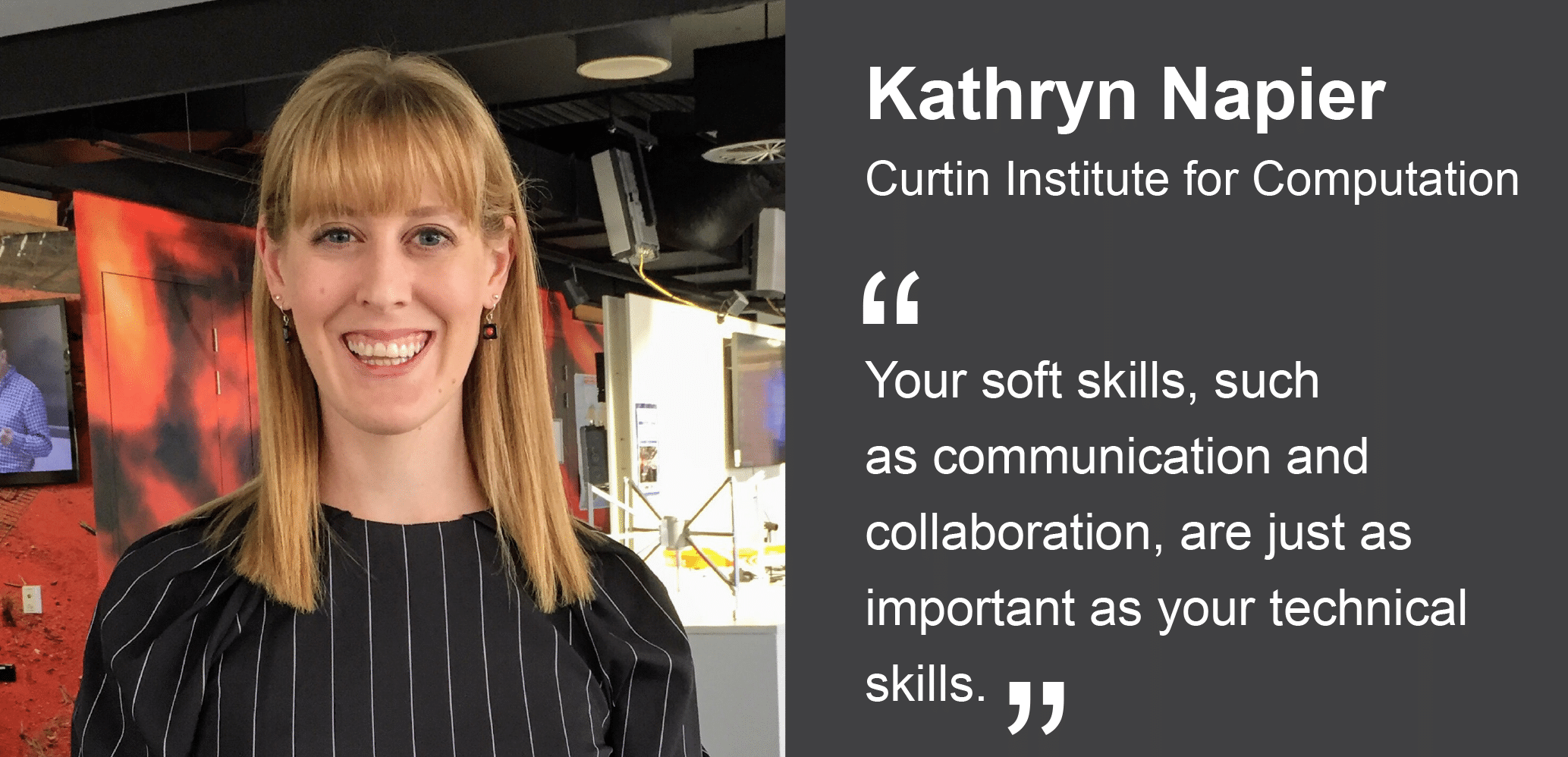Data Scientist Profile
Kathryn Napier

What is your academic background?
My undergraduate and postgraduate research was in the field of Ecological Physiology. I completed two Bachelor of Science degrees majoring in Mathematics and Statistics (2006) and Biomedical Science with honours (2007) and then moved on to complete a PhD in Veterinary Studies at Murdoch University in 2014 (I’m not a Veterinarian though!). I then spent five years as a Research Associate in the fields of Health Informatics and Bioinformatics, also at Murdoch University.
Have you completed any other training in data science?
I have attended coding training workshops, but have no other formal training specifically in Data Science. My current and previous roles have afforded some really good opportunities to learn and develop skills while working on specific projects.
If you pivoted into a data science role from another area, how did you go about this and what advice would you give others looking to do the same?
I have always been interested in data and data analysis, and my previous roles allowed me to learn and develop my skills in different ways. Whilst I hadn’t worked as a Data Scientist previously, my research, analytical and collaborative skills assisted in my pivot into a Data Science role. My advice for others is to recognise how your existing skills and strengths could be applied in the field of Data Science, and be willing to learn and upskill.
What sparked your interest in working with data?
I really enjoyed studying statistics in high school and was keen to progress this interest further at University. I wanted to build a career in research, and I understood the importance of being able to understand, analyse and interpret your research data. Studying Biomedical Science and Mathematics and Statistics at University seemed like such a natural fit, though it wasn’t a common degree combination at the time.
How did you come to work in your current role?
I applied! I was looking for a role that would allow me to significantly expand my technical skills, that also afforded the opportunity to work on interesting projects that have a positive and meaningful impact.
What sort of projects have you been working on?
I work on a variety of projects at the CIC, working both with University researchers and external collaborators. Recently I’ve worked with physiotherapy and exercise science researchers to develop a machine learning model to investigate joint kinematics in ballet (i.e. how high and how often ballet dancers lift their legs during ballet classes). Currently I’m working with collaborators from PathWest Laboratory Medicine WA, the Department of Health, and Curtin University’s Health Research and Data Analytics Hub on two projects that aim to derive insights from pathology data that will lead to improvements in patient care in the diagnosis of sepsis and chronic kidney disease.
What tools/platforms do you use in your work?
I use python and R coding languages, a little bit of bash, Jupyter lab/notebooks, RStudio, Git and GitHub.
What has been a highlight of your data science career so far?
Working in my current role. I really enjoy working with, and learning from, such a supportive, diverse and gender equal team of Data Scientists.
What challenges have you faced as a data scientist?
I struggle with imposter syndrome, and feeling like I’ll never learn enough about the myriad of tools that are available.
What are some of the big areas of opportunity/questions you want to tackle in this space?
I’m really excited to be working on some long-term projects in the Health domain. My experience in Health Informatics has instilled a passion to utilise data and technology to provide insights that can improve outcomes for patients. There is so much potential for meaningful and impactful change in this area through Data Science.
What excites you most about recent developments in Data Science?
I’m personally excited to see the expansion of predictive analytics in healthcare and how this will contribute to personalised medicine, particularly here in WA.
What does the future of data science look like?
The field is constantly evolving, and our roles will naturally change over time. The application of machine learning algorithms and predictive analytics will continue to become more mainstream and easier than ever to deploy, but I believe there will still be a role for Data Scientists to interpret and communicate results – and to also develop the next suite of algorithms that don’t yet exist.
For people considering a career in data science, what is one piece of advice you would give?
Your soft skills, such as communication and collaboration, are just as important as your technical skills.
We would like to acknowledge and pay respect to the traditional owners of the land on which the WADSIH office is located, the Whadjuk people of the Nyungar Nation.